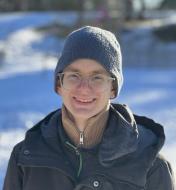Cedric Bagheri Åkermark

Presentation
I have an interest in biodiversity in forest ecosystems and how it is affected by forest management and climate change. My PhD is part of the larger Formas-funded project Aquabioex - How to protect what we do not know we have. (https://www.slu.se/en/research/research-catalogue/projekt/a/aquabioex/) The aim of this project is to identify, understand and learn how to manage aquatic biodiversity in the intensively managed Swedish forests, which also are under pressure from an increasingly extreme climate.
We currently know very little about what is living in small headwater streams in the forest landscape, since these systems are generally not included in monitoring programs. We especially do not know how biodiversity is affected by forest management and climate change. Apart from small natural streams the Swedish forest landscape has a large network of forest ditches. The difference between a natural stream and a ditch is not so obvious as one might think and there are also many so-called dreams (straightened streams or naturalized ditches) in the landscape. Streams, ditches, and dreams are treated differently when the forests are managed, but we do not know if the biological communities differ.
I primarily use metabarcoding on DNA collected in the environment (eDNA) to understand the biodiversity of these systems. My main supervisor is Lenka Kuglerová and my assistant supervisors are Eliza Maher Hasselquist, Brendan Mckie (Department of Aquatic Sciences and Assessment) and Maria Kahlert (Department of Aquatic Sciences and Assessment).
One of my major driving forces is the inspiration I get from the Bahá'í Faith, a global movement with the unity of mankind at the core of its principles. I am a member of the professional organization International Environment Forum through which I have been engaged in public discourses about humanity’s relationship with nature. I enjoy spending my free time with my family and going for runs in the forest.
Research
I am interested in how aquatic biodiversity is affected by forest management in an increasingly extreme climate. Man-made ditches, human modified streams or naturalised ditches (termed Dreams) and small natural streams (with a catchment area under 15 km2) make up over 90 % of the total length of running water in Sweden.
Intensifying production forestry create severe pressures on forest waters. Small waterways are under pressure from forest management and often lack sufficient riparian buffer zones. Together with changes in the timing, duration and magnitude of streamflow regimes, caused by an increasingly extreme climate, these multiple stressors interact in different ways and can likely cause large threats to biological communities in small forest streams. Currently we do not have the capacity to predict responses in biodiversity to these pressures, nor the knowledge of how to best protect biodiversity in small headwater waterways as these systems generally are not included in monitoring programs.
The aim of my thesis project is to create a snapshot of the biodiversity in small forest waterways. This will be done by using DNA metabarcoding to assess biodiversity patterns of heterotrophic bacteria and benthic diatoms in from different substrates in natural streams, ditches and dreams. Metabarcoding is a technique which helps us learn which organisms are present by analyzing DNA collected in the environment (eDNA). Further, the project will assess the effect of extreme hydrological events and forestry pressures on in-stream biodiversity. Finally, the degree to which small forest waterways are monitored will be analysed and suggestions of which indicators should be included in future monitoring programs will be provided.
Environmental analysis
I am the PhD representative in FOMAN-S, the Council for Environmental Monitoring and Assessment at the Faculty of Forest Sciences and NSM, the Board for appointing senior environmental assessment specialists at SLU. I am also the deputy PhD representative in FOMAR - the Council for Environmental Monitoring and Assessment at SLU.
Background
2021 - Bachelor’s degree in Biology, Stockholm University.
2024 - Master’s degree in ecology, Umeå University.
Selected publications
2024 -"The effect of tree continuity and structural diversity on beetle (Coleoptera) biodiversity in Swedish boreal forests" - https://stud.epsilon.slu.se/19887/ (Master's thesis)
2022 - Åkermark, Cedric, Camilla Liénart, Chiara D’Agata, and Agnes ML Karlson. “Long-Term Decrease in Baltic Sea Blue Mussel Shell Length.” Estuarine, Coastal and Shelf Science 276 (October 2022): 108029. https://doi.org/10.1016/j.ecss.2022.108029. (Data from Bachelor's thesis)